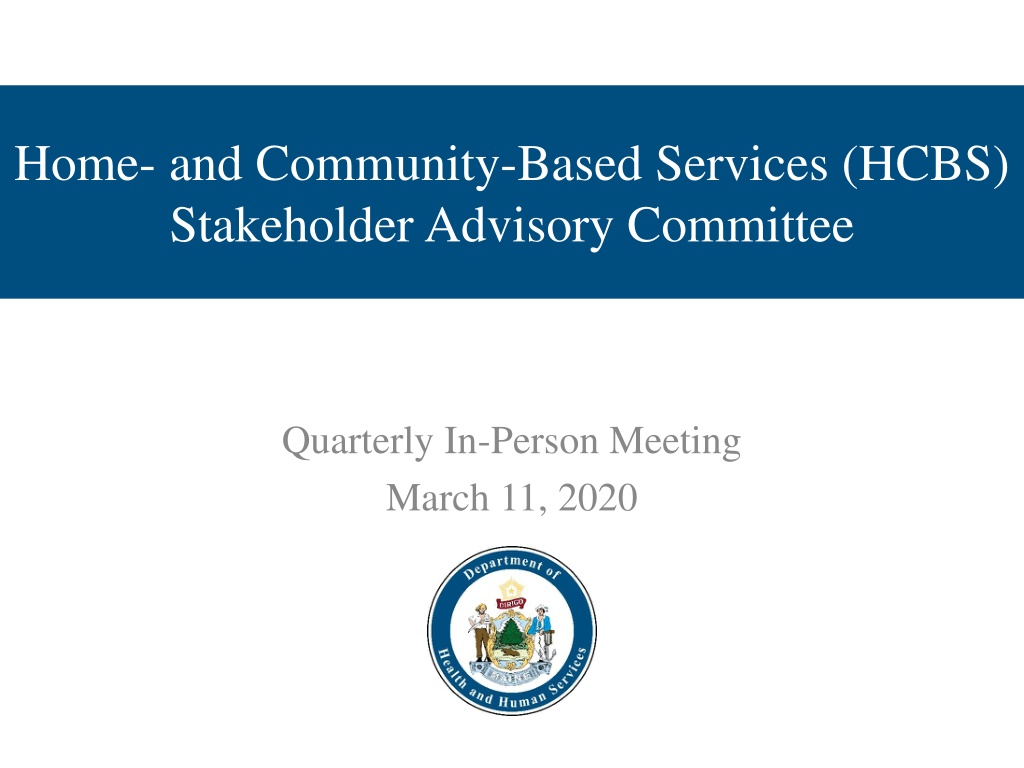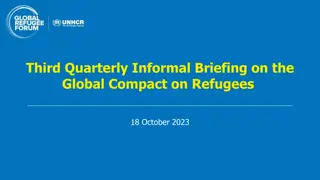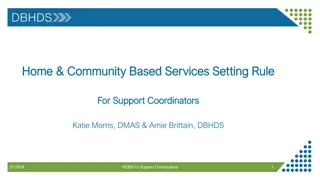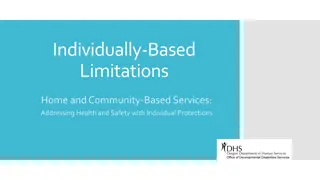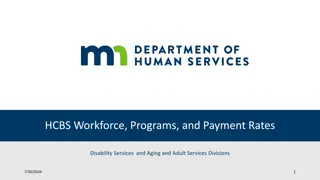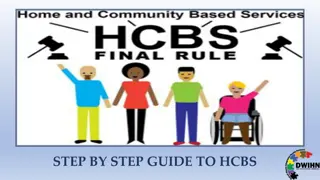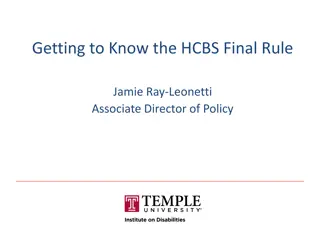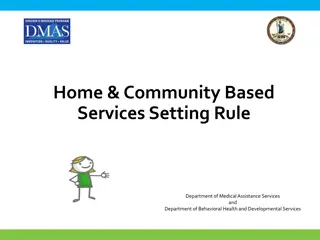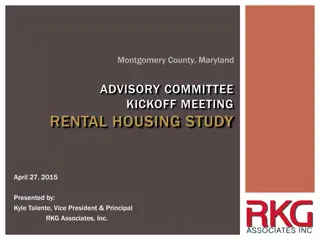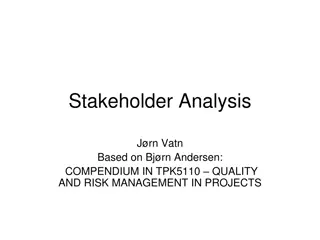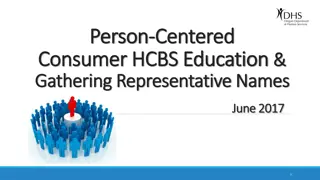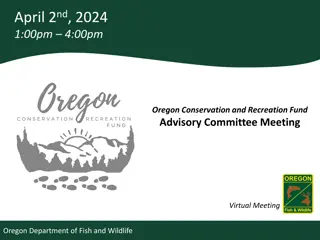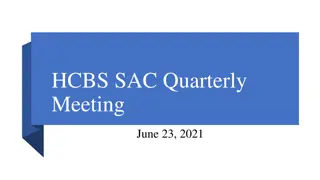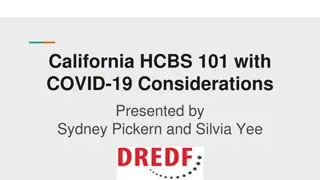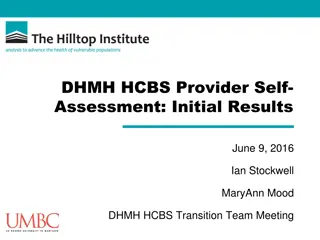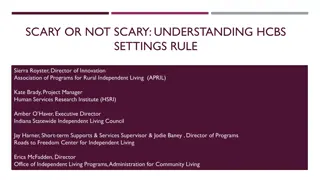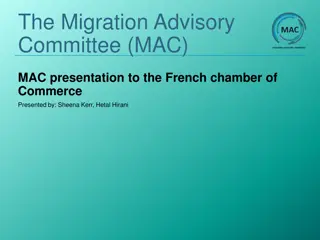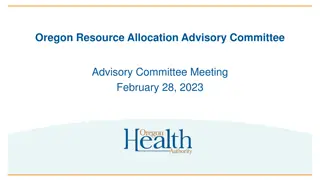HCBS Stakeholder Advisory Committee Quarterly Meeting Overview
The Home- and Community-Based Services (HCBS) Stakeholder Advisory Committee held a quarterly in-person meeting on March 11, 2020. The agenda included discussions on the Statewide Transition Plan, Individual Experience Assessment, workplan requests, and stakeholder engagement. Pre-meeting activities involved virtual calls, transition plan status updates, and feedback sessions. Key topics included state settings alignment with federal requirements, provider changes, participant rights awareness, and compliance assessments. Stakeholders reviewed HCBS state authorities and standards compliance, proposed strategies for remediation, and emphasized stakeholder involvement in plan development.
- HCBS
- Stakeholder Advisory Committee
- Meeting Overview
- Statewide Transition Plan
- Compliance Assessment
Download Presentation

Please find below an Image/Link to download the presentation.
The content on the website is provided AS IS for your information and personal use only. It may not be sold, licensed, or shared on other websites without obtaining consent from the author. Download presentation by click this link. If you encounter any issues during the download, it is possible that the publisher has removed the file from their server.
E N D
Presentation Transcript
Home- and Community-Based Services (HCBS) Stakeholder Advisory Committee Quarterly In-Person Meeting March 11, 2020
Agenda Welcome & Introductions Pre-Quarterly Meeting Activities Interactive Discussion on Statewide Transition Plan (STP) & Individual Experience Assessment (IEA) Wrap-up Workplan and Timeline Requests of SAC Members Break Optional Working Groups Heightened Scrutiny Ongoing Stakeholder Engagement Participant Relocation out of Settings that won t comply with HCBS requirements by March 2022 Maine Department of Health and Human Services 2
Pre-Quarterly Meeting Activities Virtual SAC Member Calls Discussion of Status of Statewide Transition Plan Development Request for Participant/Self-Advocate Participation in Piloting of Individual Experience Assessment (IEA) Feedback on Quarterly Meeting Format Monthly HCBS Provider Meetings Maine Department of Health and Human Services 3
Questions to SAC & Discussion (1) Are there any questions about how the state settings requirements align with the federal HCBS regulation? Do you have any questions or concerns about these requirements? Do you think providers will have to make significant changes to come into alignment with these requirements? Beyond the Your Right to Community Life information brief, are there other things the state could be doing to make sure that participants of HCBS waiver programs are aware of the rights afforded to them as part of the HCBS settings requirements? Maine Department of Health and Human Services 7
Accurately identify all HCBS state authorities and settings impacted by the rule; List and assess all state standards to determine areas where existing state policies are fully compliant, partially compliant, non-compliant or silent as it relates to one or more components of the federal HCBS rule; Initial Approval of STP Propose a strategy for remediating any areas of partial compliance, noncompliance or silence found during the systemic assessment of state standards; Describe all key processes and milestones of the state s implementation strategy; and Assure adequate stakeholder involvement in the development of the STP, including but not limited to affording stakeholders the opportunity to provide written formal comments on the STP during a public comment period. 8 Maine Department of Health and Human Services
Systemic Assessment All policies, regulations, and licensing rules related to all five HCBS waivers were reviewed to determine the level of compliance with each of the state and federal requirements (silent, fully, partially, or non-compliant). Key Trends in Review of Policies Missing Key Definitions Lack of emphasis on conflict-free case management and person-centered planning No clear prohibition of institutional settings from receiving MaineCare HCBS funding Language that either diluted, marginalized or did not include certain participant rights afforded with in the federal HCBS rule. Maine Department of Health and Human Services 9
A new, separate section in Chapter 1 of the MaineCare Benefits Manual designed specifically for and about the provision of HCBS and the expectations of settings providing HCBS under one or more of the MaineCare HCBS waiver programs. Proposed Systemic Remediation Submission of a legislative proposal to the state legislature that provides a global bill outlining the specific state and federal HCBS requirements expected of various categories of providers and settings moving forward. Specific modifications to any state standards where there was a clear issue of non-compliance would still be addressed within the body of the state standard in question. However, there were very few areas where any state standard was deemed non-compliant (as opposed to partially compliant). 10 Maine Department of Health and Human Services
Questions for SAC & Dialogue (2) What do you think about the state s proposal to create a separate piece of legislation and regulation focused solely on home and community-based services funded through MaineCare? Do you have any concerns or questions about the process the state went through to review the various state policies that needed to be reviewed to complete the systemic assessment? Maine Department of Health and Human Services 11
Maines 5-Phase Strategy for HCBS Rule Implementation Provider Self- Assessment of Setting Compliance Setting Compliance Validation by State Ongoing Monitoring & Quality Assurance Setting Remediation: Transition-to-Full- Compliance Provider Attestation of Setting Remediation & Full Compliance Maine Department of Health and Human Services 12
HCBS Provider Validation Process Validation of the Self-Assessment Responses Provider Self- Assessment On-Site Reviews, Individual Experience Assessments, and/or Desk Reviews Notification to Providers and Implementation of Remediation Ongoing Compliance Monitoring of Settings Notification of Final Determination Maine Department of Health and Human Services 14
How Does Maine Plan to Validate Provider Self- Assessments? 1st Method: On-Site Visits Up to 630 settings will receive On-Site Visits (22.44% of all settings) 3 Non-Residential setting types (100% will get on-site) Community Supports, Work Supports-Group & Clubhouse 4 Residential setting types (24% will get on-site) 13.26% Group Homes (1-2 person) 37.59% Group Homes (3-5 person) 100% Group Homes (6+ person) 10.20% Family Centered Homes 10.03% Shared Living-Related Family Member 35.24% Shared Living-Unrelated Provider *Proportional selection of settings in each region, based on total number of each type of setting in each region. Maine Department of Health and Human Services 16
Proposed Plan: Prioritizing Focus of On-Site Validation Visits Setting Self-Assessment questions for which provider answers suggest partial or noncompliance with Settings Rule requirements Any setting Self- Assessment questions unanswered by provider Policy Review for a setting that is first for a specific provider agency Setting Self-Assessment questions that address whether the setting may be isolating and therefore subject to Heightened Scrutiny process Brief interviews with people receiving HCBS who are present in the setting Remainder of consideration for completing validation Maine Department of Health and Human Services 18
How Does Maine Plan to Validate Provider Self- Assessments? (2) 2nd Method: Individual Experience Assessment (IEA) Survey All residential settings that do not receive an on-site visit Support Coordinator/Care Coordinator/Case Manager conducts in-person IEA in the setting with each member (and guardian if one appointed) receiving services in the setting Information will be compared with Provider Self-Assessment to determine current compliance with any areas of partial or noncompliance that need to be addressed If concerns about lack of alignment between Provider Self-Assessment and IEAs, either on-site visit or desk review will also be used Maine Department of Health and Human Services 19
How Does Maine Plan to Validate Provider Self- Assessments? (3) 3rd Method: Desk Level Reviews Provider will be contacted to submit information and documentation to support answers in Self-Assessment OADShas identified staff who will conduct Desk Level Reviews EconSys is developing desk review process and procedures Desk Reviews will occur on a rolling basis, between February 2020 and October 2020 Settings selected for Desk Level Reviews based on discrepancies identified between the Provider Self-Assessment and results of Individual Experience Assessments Maine Department of Health and Human Services 20
Summary of Setting Validation Strategies Onsite Validations of 630 settings (all Community Supports Settings and 500 Residential Settings across Waivers & Setting Categories) Individual Experience Assessments across all settings, with goal of offering all participants the option of participating Desk Reviews of any setting whose IEA responses reveal inconsistencies with provider self-assessment responses 21 Maine Department of Health and Human Services
Questions for SAC & Discussion (3) Setting Validation Strategies What do you think about the approach the state is taking to validate settings and make sure they are meeting all of the requirements expected of HCBS settings? What do you see as being positive with the approach? Onsite Validations of 630 settings (all Community Supports Settings and 500 Residential Settings across Waivers & Setting Categories) Individual Experience Assessments across all settings, with goal of offering all participants the option of participating Desk Reviews of any setting whose IEA responses reveal inconsistencies with provider self-assessment responses What questions or concerns do you have about the approach the state is taking to making sure settings are complying with the federal HCBS settings criteria? Maine Department of Health and Human Services 22
Questions for SAC & Discussion (4) Individual Experience Assessment What do you think about the length of the survey? Too long Too short Just about right What challenges do you think case managers will experience in trying to get participants to participate in the IEA? Do you think many people will refuse to participate? Are there questions within the IEA that are confusing or that you don t understand? Do you think that the IEAs will give the state enough information to determine whether a setting is compliant with the state and federal HCBS requirements? Maine Department of Health and Human Services 23
Setting Remediation Providers will receive the results of a setting validation within 30 days of the validation process being completed for that setting Based on the setting validation results, each setting with areas of partial or non- compliance with be required to have a setting-specific Transition-to- Compliance Plan. DHHS/EconSys will provide a plan template for providers to use, which will include remediation options to help them develop their transition-to-compliance plans. After they receive their settings validation results, providers will have 30 days to submit an approvable Transition-to-Compliance Plan for the setting. State and/or EconSys staff will be available to answer questions and provide technical assistance to providers as they develop these Transition-to- Compliance Plans OADS will continue to host monthly webinars to provide additional technical assistance and support to providers. Maine Department of Health and Human Services 24
Setting Remediation (2) All Transition-to-Compliance Plans must be fully implemented (all action steps completed) by October 31, 2021. The state and EconSys will monitor provider progress on implementation of their Transition-to-Compliance Plans to ensure the October 31, 2021 deadline is met. If any setting does not meet the October 31, 2021 deadline, the state is required to ensure safe and orderly transitions of individuals wishing to continue to receive HCBS to compliant settings so that these relocations are completed in the person-centered manner by no later than March 17, 2022. Maine Department of Health and Human Services 25
Questions for SAC & Discussion (5) Setting Remediation Activities Do you think the timeline for settings to remediate issues of partial or non-compliance realistic? What types of technical assistance would be valuable to providers while they are in the process of remediating issues? Should there be a role of participants and family caregivers in terms of helping providers identify potential solutions and strategies for addressing areas where remediation is required? Maine Department of Health and Human Services 26
For Future Discussion: Other Components of the STP Heightened Scrutiny Additional Engagement of and Technical Assistance for Providers, Direct Support Professionals, Case Managers, Family Caregivers and Participants Ongoing Monitoring of Settings & Relocating Participants from Settings that cannot come into compliance with the HCBS requirements Maine Department of Health and Human Services 27
MaineCare HCBS SAC Quarterly Meeting WRAP-UP OF PART 1 Maine Department of Health and Human Services 28
Workplan and Timelines STP Submitted for Initial Approval ~April 17, 2020 Systemic Remediation Work Legislative Strategy Develop draft language for global HCBS legislative proposal (March-April 2020) Regulatory Strategy Develop draft language for new section in Chapter 1 of the MCBM re: requirements and expectations of settings providing MaineCare HCBS. Office on Aging & Disability Services (OADS) and Office of the Attorney General (OAG) will work on development on both regulatory and bill language (Mar-June 2020) OADS will send draft regulation to OAG for review NLT 8/31/2020. Mockup legislative bill to be submitted to Commissioner s office in preparation for the legislative session (November 2020) Commissioner s Office shares with Governor s Office (November-December 2020) Will file with SOS by 09/30/2020 Comment period will begin on or before 10/15/2020 and last for thirty (30) days. Legislation finalized by the legislature s Revisor of Statutes Comment period to last for thirty (30) days, thus ending on or around 11/14/2020. Legislature takes up bills in the spring of 2021 Adoption date (DHHS Commissioner signature by 12/31/2020). Setting Validation Activities (February-October 2020) Setting Remediation Work (March 2020-October 2021) Maine Department of Health and Human Services 29
Requests of SAC Members 1. Help us get the word out about the STP Public Comment Period Notice & Summary All comments due March 31, 2020 at 11:59 p.m. ET 2. Share Your Right to a Community Life Information Sheet with HCBS Waiver Participants, Families and Direct Support Professionals Maine Department of Health and Human Services 30
3 1 QUESTIONS? THANK YOU! And now .a Break!
HCBS SAC Quarterly Meeting PART II: WORKING GROUP DISCUSSIONS Maine Department of Health and Human Services 32
For Future Discussion: Three Working Groups Topics 1. Heightened Scrutiny What types of things should settings that have characteristics that isolate HCBS participants from the broader community do to address their institutional presumption? Additional Engagement of and Technical Assistance for Providers, Direct Support Professionals, Case Managers, Family Caregivers and Participants 2. How can the state continue to engage stakeholders beyond the public comment process in the ongoing implementation activities of the HCBS statewide transition plan? What types of additional informational resources, training and technical assistance do different kinds of stakeholders need relative to the HCBS requirements? Relocating Participants from Settings that cannot come into compliance with the HCBS requirements 3. What types of resources and support should the state provide to any participants (and their families) who end up needing to relocate from their current setting in the event the setting cannot or won t come into compliance by the end of the transition period? How much time should the state and the provider give to participants to identify and transition to a different setting? Maine Department of Health and Human Services 33
